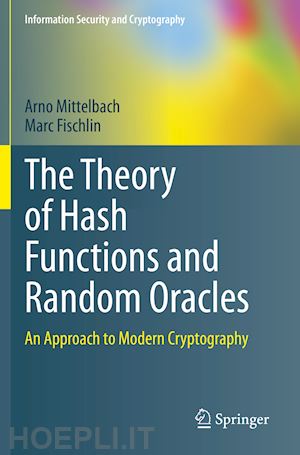
Questo prodotto usufruisce delle SPEDIZIONI GRATIS
selezionando l'opzione Corriere Veloce in fase di ordine.
Pagabile anche con Carta della cultura giovani e del merito, 18App Bonus Cultura e Carta del Docente
Hash functions are the cryptographer’s Swiss Army knife. Even though they play an integral part in today’s cryptography, existing textbooks discuss hash functions only in passing and instead often put an emphasis on other primitives like encryption schemes. In this book the authors take a different approach and place hash functions at the center. The result is not only an introduction to the theory of hash functions and the random oracle model but a comprehensive introduction to modern cryptography.
After motivating their unique approach, in the first chapter the authors introduce the concepts from computability theory, probability theory, information theory, complexity theory, and information-theoretic security that are required to understand the book content. In Part I they introduce the foundations of hash functions and modern cryptography. They cover a number of schemes, concepts, and proof techniques, including computational security, one-way functions, pseudorandomness and pseudorandom functions, game-based proofs, message authentication codes, encryption schemes, signature schemes, and collision-resistant (hash) functions. In Part II the authors explain the random oracle model, proof techniques used with random oracles, random oracle constructions, and examples of real-world random oracle schemes. They also address the limitations of random oracles and the random oracle controversy, the fact that uninstantiable schemes exist which are provably secure in the random oracle model but which become insecure with any real-world hash function. Finally in Part III the authors focus on constructions of hash functions. This includes a treatment of iterative hash functions and generic attacks against hash functions, constructions of hash functions based on block ciphers and number-theoretic assumptions, a discussion of privately keyed hash functions including a full security proof for HMAC, and a presentation of real-world hash functions.
The text is supported with exercises, notes, references, and pointers to further reading, and it is a suitable textbook for undergraduate and graduate students, and researchers of cryptology and information security.
Introduction.- Preliminaries: Cryptographic Foundations.- Part I: Foundations.- Computational Security.- Pseudorandomness and Computational Indistinguishability.- Collision Resistance.- Encryption Schemes.- Signature Schemes.- Non-cryptographic Hashing.- Part II: The Random Oracle Methodology.- The Random Oracle Model.- The Full Power of Random Oracles.- Random Oracle Schemes in Practice.- Limitations of Random Oracles.- The Random Oracle Controversy.- Part III: Hash Function Constructions.- Iterated Hash Functions.- Constructing Compression Functions.- Iterated Hash Functions in Practice.- Constructions of Keyed Hash Functions.- Constructing Random Oracles: Indifferentiability.- Constructing Random Oracles: UCEs.- Index.
Dr. Arno Mittelbach is the Director of Development at AGT International. He received his PhD from Technische Universität Darmstadt in 2015. Prof. Dr. Marc Fischlin has been Professor for Cryptography and Complexity Theory at the Technische Universität Darmstadt since 2011. He previously held postdoctoral positions at research institutes such as the Fraunhofer Institute for Secure IT, University of California, San Diego, and ETH Zürich. His team's main research area is complexity-based cryptography.











Il sito utilizza cookie ed altri strumenti di tracciamento che raccolgono informazioni dal dispositivo dell’utente. Oltre ai cookie tecnici ed analitici aggregati, strettamente necessari per il funzionamento di questo sito web, previo consenso dell’utente possono essere installati cookie di profilazione e marketing e cookie dei social media. Cliccando su “Accetto tutti i cookie” saranno attivate tutte le categorie di cookie. Per accettare solo deterninate categorie di cookie, cliccare invece su “Impostazioni cookie”. Chiudendo il banner o continuando a navigare saranno installati solo cookie tecnici. Per maggiori dettagli, consultare la Cookie Policy.